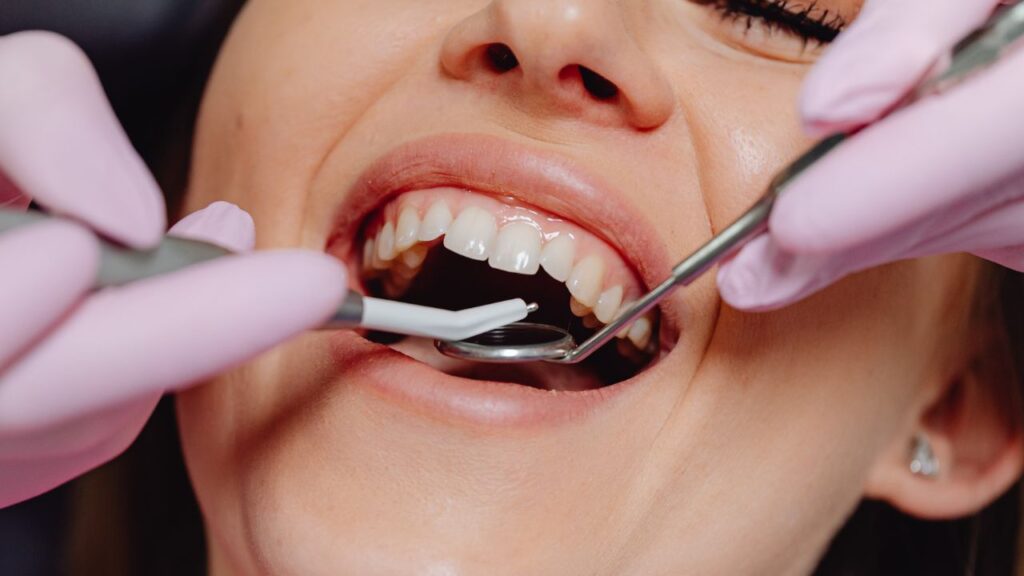
Yes, using a water flosser on sensitive teeth can be done without causing pain or damage if done correctly. We all can agree on how imperative keeping your teeth is, and how the immediate absence of flossing can cause cavities and other oral health problems.
However, taking the right steps when it comes to addressing your super sensitive teeth is a great start to getting your smile back!
in this guide we’ll be explain how to help sensitive teeth.
Why do your teeth hurt after water flossing?
While traditional string flossing can clean your teeth, water flossers have been proven to do it more effectively, gently, and in less time than string flossing. And while water flossing can be helpful to your gums, you might notice that your teeth hurt after cleaning them with the water flosser.
Here are several reasons why your teeth hurt after water flossing and what you can do about it.
1) Water flossing isn’t always the best choice.
If you have gum disease, using a water flosser is not a good idea because it can spread bacteria between your teeth and gums. Also, if you have braces and/or crowns on your teeth, you may not be able to effectively use water flossers because they don’t fit as well in tight spaces. Lastly, if your gums are very sensitive, water flossing might irritate them rather than soothe them.
2) Waterpik might be a better option for you.
Waterpik flossers are perhaps the next best thing to string flossing. You can choose how wide of an area you want to water floss, and there are several options to adjust the water stream’s pressure, stream, and position. Waterpik also has different tips for different parts of your mouth. Your dentist may recommend a Waterpik if you have gum disease or dental problems that are more difficult to treat with a string flosser.
3) You don’t have the correct technique for water flossing.
Make sure you keep your head in a neutral position while flossing, and adjust your head position according to the size of your mouth and teeth. If you are going too fast, then it will hurt your teeth and gums. Also, the pressure will be too high if you aren’t bending your head down enough.
4) You don’t have enough suction.
If there’s insufficient suction from the water flosser, it can’t effectively remove plaque from tight spaces. So, make sure that you are using a water flosser with a water pressure higher than that recommended by your dentist.
5) You don’t have the correct water temperature.
Some experts recommend using water at 40� C (104� F). Your dentist may also recommend a specific temperature for your mouth, and keep in mind that if your water is too cold, it will hurt your gums. If the water is too warm, it won’t effectively remove plaque between your teeth. Also, keep in mind that if the water temperature in your local region is too high or low, it can affect the effectiveness of the flossing procedure.
6) You may be using an inappropriate drainage tip.
If you have had a deep cleaning done recently, your dentist may have prescribed a specific drain tip for your mouth. Also, if you have back teeth that are spaced closely together, then you might need to use a drain tip that can accommodate this narrow space.
What is the best water flosser for sensitive teeth?
To clean sensitive teeth without pain effectively, it’s recommended to use the Aquasonic Aqua Flosser with a low pressure water stream. This will ensure you are able clean between your teeth and gum line without irritation and effortlessly be able to clean hard to reach places.
Click here to get a full review on the Aquasonic Aqua Flosser

How To Protect Your Sensitive Teeth
Protecting Your Gum Line:
Cleaning Your Mouth:
Root Tips:
Reduce Pressure From Brushing Teeth
Mouthwash:
Fluoride toothpaste:
Conclusion:
As millions of people all around the world know, sensitive teeth can make life in general a nightmare.Owning a water flosser for sensitive teeth comes in handy with helping with discomfort that can make eating or drinking your favorite foods a painful experience. Although you may suffer from sensitive teeth, you can rest assured that they can be treated. If you are still needing assistance with flossing your sensitive teeth, please check out our reviews on waterpiks.
